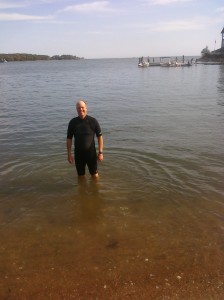In Short Beach, Columbus Day is the semi-official end of the swimming season. When it’s chilly but clear, like this weekend, it’s not all that easy to get in the water. I ended up making the shift to wetsuits on Friday afternoon.
What did Columbus discover? Certainly not America: he thought it was China, it had been visited many times before by Northern Europeans since the time of Erik the Red, and he had no interest in new places. The thing he found that was new — or at least new-ish, for the part of Europe that had been formerly oriented toward the Mediterranean — was the deep sea. “Admiral of the Ocean Sea” was what the Spanish called him. He wasn’t really a land creature.
Today Olivia & I pulled on our 2mm Body Glove suits & walked past the fall colors to the beach.  A few teenagers were diving off the Yale boathouse docks & then shrieking as they rushed to get out. The wet suits make it a little easier to get in, though it’s still a shock. The real payoff is that as soon as that film of water gets warmed up, you feel ready to stay.
A few teenagers were diving off the Yale boathouse docks & then shrieking as they rushed to get out. The wet suits make it a little easier to get in, though it’s still a shock. The real payoff is that as soon as that film of water gets warmed up, you feel ready to stay.
How many more swimming days are left in 2010?
Not enough.



